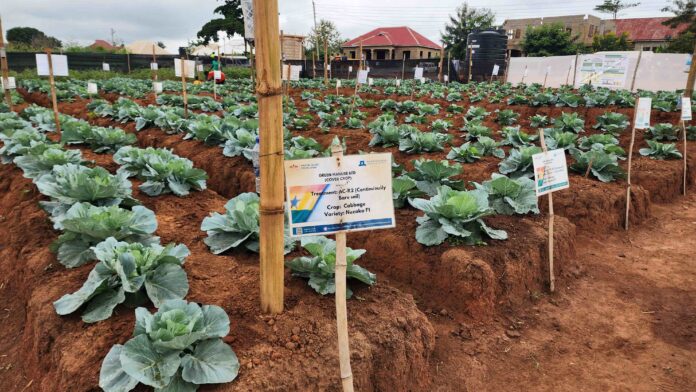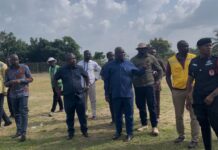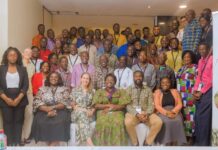The East-West Seed Knowledge Transfer Foundation has inaugurated a new knowledge transfer centre in Duayaw Nkwanta in the Ahafo Region, with the goal of empowering smallholder farmers through hands-on training and sustainable modern agricultural practices.
The initiative forms part of the Foundation’s broader effort to improve vegetable farming across Ghana, transforming it into a viable business venture for thousands of rural farmers.
At the opening ceremony, Kwadwo Donkor, Program Lead at East-West Seed Knowledge Transfer Foundation, underscored the importance of the “Transforming Vegetable Farming as a Business” project, which he described as pivotal in enhancing the skills and knowledge of farmers involved in vegetable cultivation.
He explained that the newly established knowledge transfer centre will serve as a hub for practical learning, where farmers and agricultural stakeholders can receive in-depth training on best practices and modern techniques in vegetable farming.
“This learning farm site is more than just a demonstration field. It is a place where knowledge meets practice, where farmers can engage directly with experts and learn through hands-on experience,” Mr. Donkor stated. “Our approach is centered around farmer-led demonstration farms, which have proven highly effective in promoting sustainable farming methods and increasing productivity.”
Since its implementation in November 2023, the project has operated across 14 districts in Ghana. With a four-year extension now secured, the initiative is set to expand its reach, aiming to train nearly 40,000 farmers in the Ahafo, Bono, Bono East, and Northern Regions. Mr. Donkor revealed that over 10,000 farmers have already benefited from the training, gaining access to crucial knowledge and resources needed to turn vegetable farming into a profitable enterprise.
“Our operations span selected districts in the Ahafo, Bono, and Bono East regions,” he noted. “The goal is to make vegetable farming more commercially viable for smallholder farmers, ensuring they can increase their incomes while contributing to national food security.”
The model of farmer-led demonstration farms, according to Donkor, is helping to bridge the gap between theory and practice, making it easier for farmers to adopt improved agricultural techniques. The emphasis on practical learning ensures that the knowledge imparted is immediately applicable on the ground, increasing the chances of long-term success for participating farmers.
Representing the Embassy of the Kingdom of the Netherlands, Marian Armoo, Agriculture Officer at the Embassy, delivered remarks on behalf of the Ambassador, H.E. Jeroen Verheul. She commended East-West Seed knowledge Transfer Foundation for its efforts in strengthening Ghana’s horticultural sector and noted that the new centre marks a meaningful advancement in the bilateral partnership between the Netherlands and Ghana.
“The opening of this knowledge transfer site is a significant step forward in the strong and evolving relationship between our two countries a relationship built on mutual respect, cooperation, and a shared vision for sustainable development,” she said.
Armoo highlighted the broad scope of agricultural support the Dutch Embassy provides in Ghana, ranging from horticulture and cocoa production to seed systems development and sustainable nature management. She also stressed the critical role that quality seeds play in transforming agriculture and securing food systems.
“Quality seeds are the foundation of successful farming,” she remarked. “They determine crop yields, climate resilience, and nutritional value. By making improved, high-yielding, and climate-resilient seed varieties available such as those showcased here by East-West Seed—we equip farmers with the tools they need to increase productivity, boost incomes, and enhance food and nutrition security.”
The Dutch Embassy has been a key partner in Ghana’s agricultural development, and its support for initiatives like the one at Duayaw Nkwanta underscores the shared commitment to achieving long-term food sustainability and economic empowerment through agriculture.








